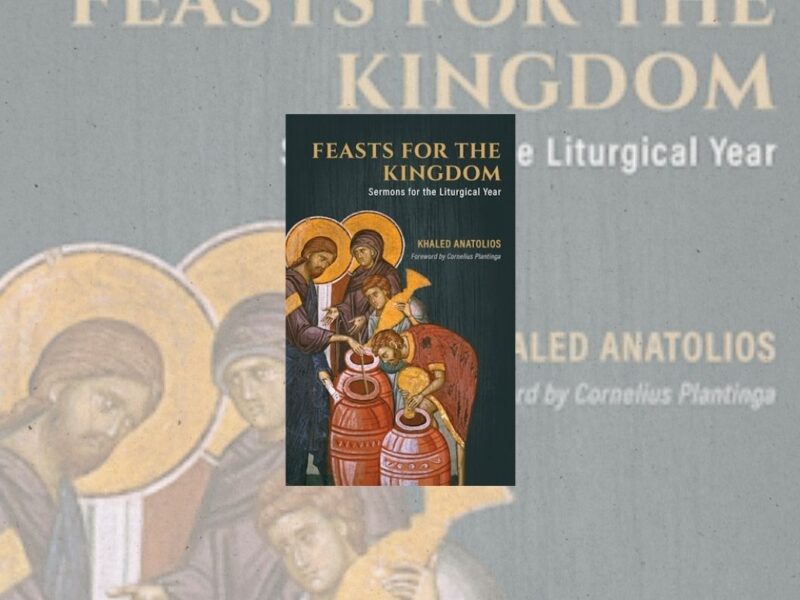Take This Cup: How God Transforms Suffering into Glory and Joy. By Charles Erlandson. Eugene, OR: Wipf & Stock, 2020. 216 pp. $46 (cloth); $26 (paper).
A deadly global pandemic is probably as propitious a moment as any for a fresh perspective on suffering, given that no one will remain untouched by the offending virus. Suffering, of course, is a constant in our post-Eden, fallen world. But while the genres of suffering are many and varied in “normal” times, differing by context and wealth and geography and genetics, the pandemic has put all of humanity on a more equal plane, with similar risks and fears, sadnesses and grief. This shared susceptibility to one particular disease reinforces the universality of suffering across humanity and the shared need for the one miracle cure that truly works.
Whether this reality was what prompted Anglican priest Charles Erlandson to write his magnificent and fresh book on the Christian approach to suffering is not plain, but certainly that backdrop enhances the relevance of Take This Cup. Fr. Erlandson approaches this difficult subject in broader fashion, however, and it is quite possible this much-needed, accessible volume (in this or future versions) will in due time become an American Anglican classic.
Christian books about suffering generally take two approaches, the pastoral or the theological. A purely pastoral approach—one of encouragement, empathy, and hope for the future—can too easily gloss over the significant theological problem of suffering for the Christian—that of how to reconcile suffering with a loving and omnipotent God. (The suffering atheist will not have this problem—but instead contends with the larger problem of the utter senselessness of everything). The purely theological or apologetic approach may tackle this “theodicy” quandary for the Christian, but that alone does not speak to the pain and anguish of the sufferer, even as it may commend potential intellectual solutions for that logical difficulty. Both approaches (the empathetic or the logical) may unwittingly diminish the crucial role of Christ. Both can fail to recognize that the Gospel is, as Fr. Erlandson reminds us, a gospel of suffering.
Both pastoral and theological needs must be addressed. The theological problem is probably the greatest impediment to trust in God at a time of intense suffering—a source of doubt, anger, frustration, loneliness, and even betrayal—on top of the actual malady being contended with. Emotion and intellect, body and soul, are at such times not easily segregated—nor should they be. Take This Cup seems very much one parish priest’s efforts cogently and understandably to explain with empathy and grace how as Christians we strive to make sense of it all. And Fr. Erlandson states his answer to the theodicy problem up front: it is, quite simply, the “partaking of Christ.” And by the end of his book, he ably succeeds in showing why for the Christian this is undeniably so, as Christ transforms suffering into glory, into joy. What is undeniably evil, Christ redeems for good.
The book’s theme, its overarching metaphor, is the cup—indeed, three cups: the cup of suffering God offers that we reject; that cup accepted and taken on our behalf by his Son; and the cup that with Christ we take, receiving both him and the associated blessings of glory and joy. (1). The cup of suffering is, ultimately, Christ himself.
There are limits and perils to hewing too rigidly to metaphors or analogies as one makes one’s case. But here there is solid biblical precedent for this image and theme, in both Old and New Testaments—and partaking from a cup has been integral to the central act of Christian worship since the life of Christ and to the present day. And while this familiar and reassuring word provides the book’s structure and title, it does not constrain it. In each section Fr. Erlandson explains the background, logic, and uplifting implications for the Christian in this redemptive progression, one that focuses squarely on Jesus. This is neither a therapeutic book nor an apologetic one: it is a book about Jesus taking on our suffering and our avenue to glory and true joy in that suffering. When we partake of Christ we partake of him completely—in his suffering and in his Resurrection.
The movement from the pain of suffering to glory and joy seems unnatural—especially if the suffering itself does not abate or if it worsens. Indeed, that movement can seem to others outside the faith a forced or feigned coping mechanism, or even a delusion. But in one of the most powerful parts of the book, Fr. Erlandson provides eleven very plain reasons why we rejoice in suffering (e.g., because God is treating us as his children; because it unites us to one other; because it transforms us into the image and character of Christ; etc.; 96‒97, and following). The promised joys are not illusive or amorphous but are ones that change us for the better. We may not be able always to discern the precise reasons for specific suffering, but we can always in that suffering discern God’s deep love.
But is this book one that would resonate with those who suffer? As I spent time with this book over the past few weeks, I deliberately took greater notice of those Christians around me who were suffering: a family whose father and husband died young from a vicious cancer; a friend whose middle-aged brother died unexpectedly; a mother with a child who may have inherited her estranged father’s mental illness; one man’s unexpected prostate cancer diagnosis; another man’s Stage 4 lung cancer diagnosis; several families contending with the aftermath of COVID deaths—and others. I wondered how this book might (or might not) be appropriate for them. In other words, will Take This Cup accomplish what its author presumably desires—to provide comfort and confidence to those who suffer—and do so at once in a pastorally sensitive and theologically sensible way?
The answer to that question likely depends largely on where the persons are, both in their suffering and in their Christian faith. It is, undeniably, a book that will make sense only to the Christian—although one cannot discount the power of God to work through such a book for the non-Christian wondering how Christians deal with suffering. The book is unlikely to be one that one would give to someone still in shock, where the urgency of the moment precludes, supplants, or necessarily delays the quest to understand and make sense of it. It is a book that could be helpful—mightily so—when that (God-prompted) imperative for understanding takes hold.
Take This Cup is particularly impressive in its catechesis, telling the story of Jesus in a way that shows he is integrally relevant to our own suffering. Indeed, that catechetical character commends it as a book perhaps best read well before one finds oneself suffering on one’s own or with others. This would be an exceptional book for an adult Sunday School class or book group.
For those in ministry to the suffering—which should be all of us, lay and clergy—this is an exceptional volume in helping us better articulate how the Christian faith informs our response to suffering and how suffering is in fact integral to the essence of that faith, from creation to incarnation to crucifixion to Resurrection.
While in the main this is an accessible book, particularly for someone college-educated, at times the author uses terms that might not be in the average layperson’s lexicon (e.g., tertium quid, transmute, transmogrify). Likewise, some will find the use of “men” to encompass men and women—however proper and well-intended and unobjectionable to this reviewer—to at this point be for many readers a distractor, easily avoided. The otherwise approachable tone of the book makes these exceptions to that seem out of place in a book worthy of as wide a readership as possible.
What makes Take This Cup an especially Anglican book is its robust and coherent integration of sacramental theology into a full and proper understanding of suffering. While this may resonate also with others of a liturgical, sacramental bent (Lutherans, Roman Catholics, etc.), this great strength of the book may also make it difficult to relate to for those outside those traditions (which includes most of those I described as suffering, above). That said, such is the clear explication of the dominical sacraments and their relationship to suffering, that this book could be an entrance to a richer life in the sacraments for those who do not now have those emphases and habits—providing perhaps a twelfth reason to rejoice in suffering. An explicit invitation for such believers—who in the American context may be a majority—might have strengthened further this section and expanded the book’s appeal.
Especially with the uncertainties of another pandemic New Year commencing, Take This Cup seems the ideal book to move to the top of one’s 2022 reading list. With confidence we can know that suffering will mark the year ahead as it has all those behind us–and that Christians and those open to the Christian faith will seek ways of coping with and making sense of it all. And as Take This Cup reminds us in compelling fashion, the greatest constant is and will be God’s redemption of us and our suffering through Christ. As Fr. Erlandson puts it in hopeful fashion (169):
Redeemed by and united to Christ, we have a part to play with him in his redemption of the world.
No one but you can offer yourself up to the Father through the Son.
Each of you has a noble and unique part to play in Jesus’s redemption of the world. Through you, he is redeeming your suffering, your life, and the suffering and lives of others.
This is the meaning of human suffering.




'Book Review: “Take This Cup”' has no comments
Be the first to comment this post!